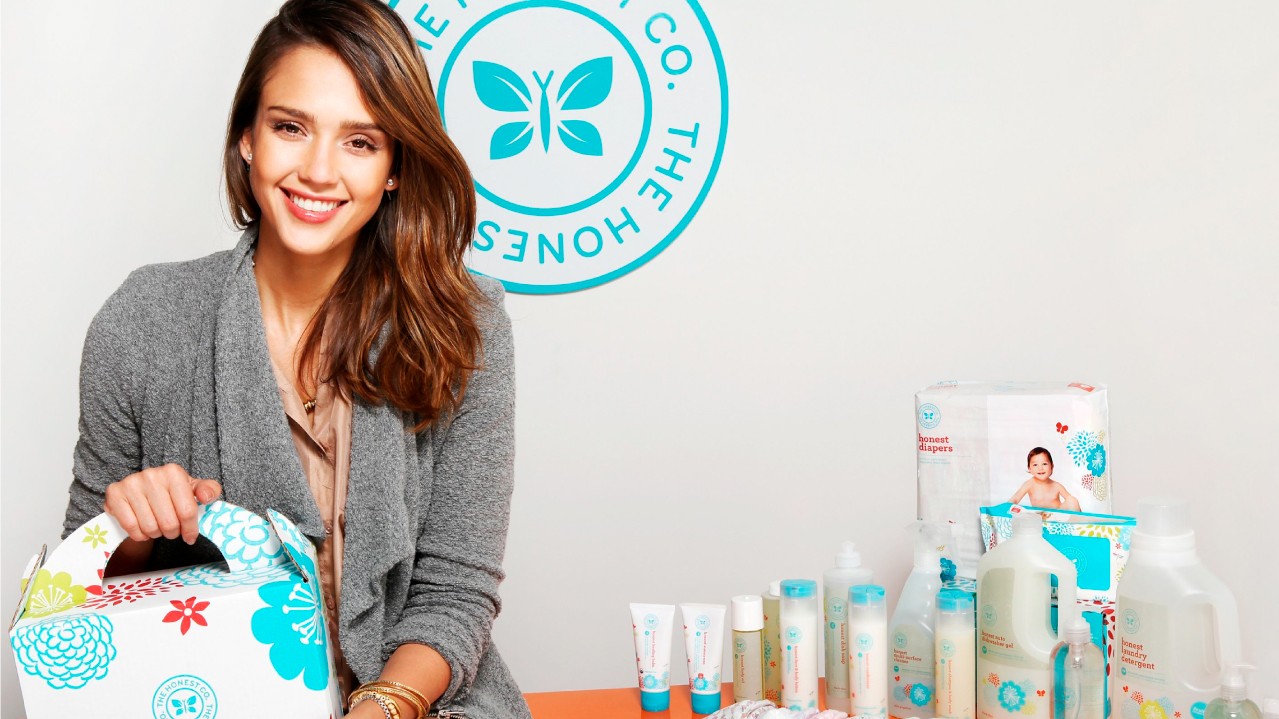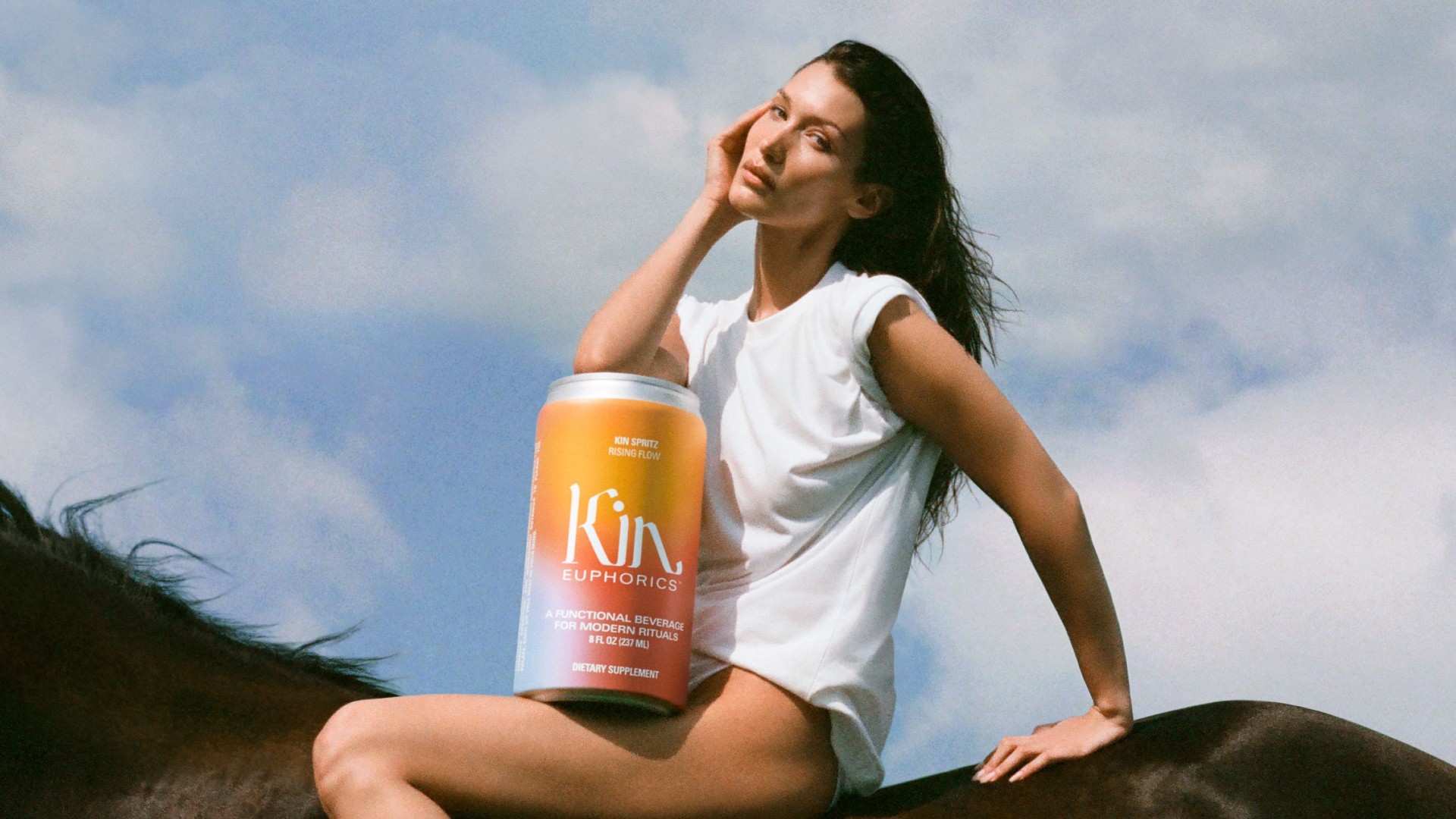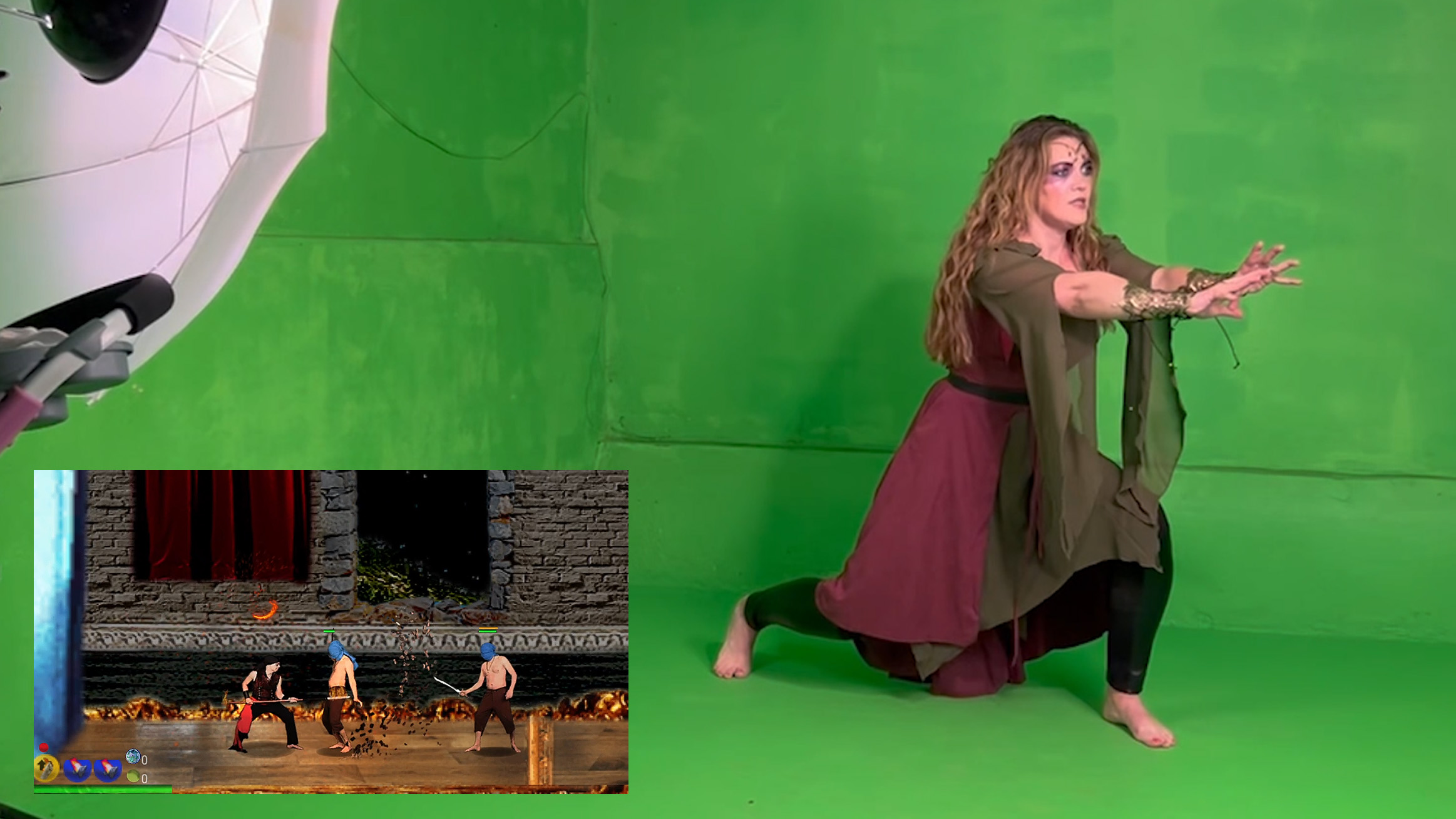12 celebrity brands that are totally nailing it, and what designers can learn from them

Sign up to Creative Bloq's daily newsletter, which brings you the latest news and inspiration from the worlds of art, design and technology.
You are now subscribed
Your newsletter sign-up was successful
Want to add more newsletters?

Five times a week
CreativeBloq
Sign up to Creative Bloq's daily newsletter, which brings you the latest news and inspiration from the worlds of art, design and technology.

Once a week
By Design
Sign up to Creative Bloq's daily newsletter, which brings you the latest news and inspiration from the worlds of art, design and technology.

Once a week
State of the Art
Sign up to Creative Bloq's daily newsletter, which brings you the latest news and inspiration from the worlds of art, design and technology.

Seasonal (around events)
Brand Impact Awards
Sign up to Creative Bloq's daily newsletter, which brings you the latest news and inspiration from the worlds of art, design and technology.
Remember when celebrity endorsements meant awkward TV ads with stars clutching products they'd probably never use? Those days are long gone.
Today's star entrepreneurs aren't just lending their names to existing products; they're building real brands from scratch, and some are absolutely smashing it (in line with the best rebrands).
Because while fame gets a brand noticed, what keeps people coming back is authentic storytelling, smart positioning, and understanding what your audience wants. And that's something we can all learn from.
So let's dive into what's working and why.
01. Rihanna: Fenty Beauty
Barbadian singer Rihanna (real name Robyn Rihanna Fenty) is one of the wealthiest and best-selling musicians of all time, with estimated sales of 250 million records, as well as being a successful actor. In 2017 she launched Fenty Beauty, and it's now a billion-dollar business. Even more importantly, it's has forced the beauty industry to up their inclusivity game.
Rihanna had a strong sense of what was wrong with beauty and wasn't afraid to fix it. As Hsu-Ying Fullick, executive creative director at Landor, explains: "Her tag line of 'beauty for all' was reflected in the debut of 40 foundation shades. She mandated that retailers stock the full range, refusing to allow her brand to be limited to lighter, more popular tones. This genuine commitment to diversity made waves, ensuring the brand was seen, noticed and celebrated."
"Fenty didn't just sell makeup," she concludes. "It sold a story that people could support. I also admired how the packaging was simple and clean, using sleek, minimal colours and graphics that supported rather than overpowered Rihanna's vision."
Sign up to Creative Bloq's daily newsletter, which brings you the latest news and inspiration from the worlds of art, design and technology.
"There are many 'celebrity brands' where the famous face is simply an ambassador," adds Fura Johannesdottir, global CCO at Interbrand. "Fenty Beauty could not be more different. It's Rihanna's brand vision with a strong purpose and she seems heavily involved."
And it's had a huge impact. "Fenty Beauty changed the game in the beauty category by solving a real issue: the lack of inclusive makeup for all skin tones," Fura explains. "Its darkest shade of foundation sold out almost immediately after the launch; clearly there was a real need for it."
Many celeb brands feel fake or performative. "But Fenty still feels fresh due to its personality and genuineness," says Hsu-Ying. "It reminds us that authenticity and purpose are the most powerful branding tools we can ever have."
02. Jessica Alba: The Honest Company
Jessica Alba made her name as an actor in TV drama Dark Angel and the Fantastic Four movies. But she's got serious business chops too. The Honest Company, which she launched in 2011, focuses on safe, eco-friendly products for babies and households. It's now pulling in record revenue of $378 million a year, reportedly making her more money than her entire Hollywood career.
It's important to stress that she isn't phoning it in. "This is not name-only endorsement," says Alan Young, joint CCO at St Luke's. "Jessica Alba has been heavily involved in product development, read studies, hired scientists and experts, and spent three years developing the range before launch."
The brand positions itself as the trustworthy option in a market full of dodgy claims. As Jason Braddy, ECD at Elmwood Singapore, explains: "It succeeded because it positioned itself as a challenger in a category filled with distrust. Jessica Alba's credibility as a parent, not just a celebrity, provides a strong and real emotional anchor that resonates with consumers. And consistency, distinctiveness, and best-in-class storytelling have all helped sell this story."
The visual branding is spot-on too, with Craig Barnes, creative director at Bloom, praising its simplicity and directness. "At its heart is a roundel, locking together the Honest name and butterfly icon," he explains. "This stamp of honest authority cuts through the clutter: a memorable reassurance of trust parents will keep coming back to.
"This simplicity allows the rest of the branding – cute colours and patterns – to pull products and ranges apart and complement aspirational nursery interiors."
03. Emma Chamberlain: Chamberlain Coffee
Emma Chamberlain is the YouTuber who pretty much invented the "messy, relatable influencer" aesthetic everyone's copying now. She has a huge Gen Z following, and a knack for making everything feel real and unfiltered.
In 2019, she launched Chamberlain Coffee, and it's found a natural home in the youth market. "Chamberlain seamlessly blends distinctiveness with cohesion across every touchpoint, ensuring that every product feels connected," enthuses Mariana Gates, strategy and culture executive at LOVE. "The playful, illustrative characters bring energy and personality to the packaging, whilst the brand's colour palette, typography and retro-inspired aesthetic taps into Gen Z's appetite for all things nostalgic.
"Beyond visual design, the brand's tone of voice is a strategic asset, reflecting Emma's own persona: approachable, witty and inclusive," Mariana adds. "This fosters authenticity and builds a strong community around the brand: two things that are key to winning with Gen Z."
The brand's activation strategy is properly smart too. As Mariana explains, "Chamberlain Coffee consistently shows up where its fans are, from pop-ups at cultural events like Coachella to unexpected collaborations with brands like Pinterest and 818 Tequila."
04. George Clooney: Casamigos
George Clooney is Hollywood royalty: actor, director, Oscar winner; the guy who makes wearing a tux look effortless, and who only seems to grow more attractive with age. He began Casamigos as a passion project with his friend Rande Gerber in 2013: they literally just wanted to make tequila they'd enjoy drinking. Fast forward to 2017, and the pair sold it to Diageo for up to $1 billion. Not bad for a side hustle.
"Casamigos works from a branding perspective because it doesn't try too hard," explains Pete Barnett, creative director at VSA Partners. "Unlike other celebrity-backed spirit brands, it avoids being flashy or overly self-serious. The advertising feels relaxed and approachable rather than a high-concept lifestyle campaign."
Its packaging reflects this understated approach. "It looks premium without feeling stodgy," says Pete. "Competitors might lean into elaborate designs and metallic finishes, but Casamigos stays pretty humble… and that restraint might be its smartest branding move."
05. Ryan Reynolds: Aviation American Gin
Ryan Reynolds is the Canadian actor who makes films like Deadpool and Free Guy hilarious by turning his self-deprecating humour into an artform. In 2018, he bought Aviation American Gin, and sold it to Diageo for $610 million in 2020. Not bad for a gin nobody had heard of a few years earlier.
How? Well, Reynolds didn't just slap his name on a bottle and call it a day; he genuinely integrated his comedic persona with the brand's story (in line with some of the best adverts out there). As Guy Cornet, creative director at Free Brands, explains: "A well-known, cool, slightly clumsy, comedic everyman fits well with the persona for an alcohol brand. Add in the fact that Ryan Reynolds can act, and you can be assured of a refreshing content campaign that will resonate with gin drinkers."
Craig adds some context. "Gin only plays a minor part in US spirits," he explains. So Aviation needed to shout like a megaphone, daring early adopters to try it instead of whiskey, vodka or rum. What better way to do this than borrowing the intrepid, crafted cues of the golden age of aviation, when the most daring risk-takers took to the skies, winning both the nation's hearts, and the world war?"
The packaging and bottle design both play a crucial part in telling this story. "Elongated glass impressions bring the eye up the bottle to an arched 'ready to go' label," explains Guy. "The lightness in design evokes a sense of motion. All it wants is to be lifted and for you to pour yourself a highball."
06. Hailey Bieber: Rhode
Hailey Bieber best known as a model, socialite, businesswoman and TV personality, as well as being the wife of Justin Bieber. In 2022 she launched Rhode, and it's quickly become the skincare brand every Gen Z-er wants to get their hands on. It's all about that direct-to-consumer approach and those perfectly timed product drops that sell out in minutes.
More broadly, the brand is all about 'less is more'. "In a beauty world driven by excess, Rhode is a masterclass in minimalism," explains Cecilia Bjare, partner and creative director at Pond Design. "Its strength lies in a tight, consistent visual identity with cool-toned packaging, clean typography and editorial-style photography, all reflecting a clear, glazed-skin aesthetic."
Indeed, it's not just on-trend: it's actually helping drive current beauty trends. "Rhode has helped define the visual codes of the 'clean girl' era: effortless, polished and curated," says Cecilia. "The brand sells primarily directly to consumers online, allowing full control over product launches and customer experience. This direct connection, combined with disciplined product drops and social content, builds excitement and exclusivity without losing focus."
07. Selena Gomez: Rare Beauty
Selena Gomez is a singer, actress and mental health advocate who's open about her own struggles and uses her platform to promote self-acceptance. In 2020, she launched Rare Beauty, and it's carved out its own space by caring about mental health alongside selling great products.
"Rare Beauty stands out by embracing a purpose driven, emotionally authentic brand identity in the beauty space," says Cecilia. "With soft, approachable packaging and a warm tone of voice, it builds a sense of connection and inclusivity that feels genuine rather than performative."
The brand's clear focus on mental health awareness is seamlessly integrated into its mission and messaging. "This makes it more than just a beauty line," Cecilia adds. "It's a platform for self-acceptance and community. It avoids chasing fleeting trends and instead champions vulnerability and individuality, which resonates deeply with consumers."
It's not just about marketing, though: Rare Beauty also has excellent products. "In particular, one standout hero item," says Jessica Taylor, ECD at adam&eveDDB London. "Creators started using and raving about the liquid blush, and rightly so. Thanks to this, and the recognisable packaging, everyone wanted one. I have two. This hero product then served for many customers as a gateway into the Rare world."
08. Dr. Dre: Beats by Dre
Dr. Dre (real name Andre Young) is the legendary rapper, producer and entrepreneur who helped define West Coast hip-hop in the 1990s. A founding member of N.W.A and later a solo artist, he also discovered and produced for artists like Eminem and 50 Cent, making him one of the most influential figures in modern music. His headphones company, Beats by Dre, which Apple acquired for $3 billion in 2024, is steeped in his deep understanding of music and culture.
"Beats by Dre got its start with clever product placement, getting their first generation headphones into the hands – and onto the ears – of top celebrities, athletes and musicians," recalls James Phillips, ECD at Toaster US. "This made it an instant status symbol. It's always been a lifestyle brand, selling the whole attitude and experience, rather than just a collection of tech specs."
As Emily Charlton-Smith from Anything is Possible adds: "The brand was built on quality, not hype, with Dre famously prioritising the sound experience over short-term profit, preserving both credibility and price-point. In a documentary, he asks, 'What are you devoted to, the art or the money?' Dre's work has always been about creating both. And when your vision is rooted in authenticity and an obsession with quality, the brand builds itself."
09. Bryan Cranston and Aaron Paul: Dos Hombres
Bryan Cranston and Aaron Paul are the actors who played Walter White and Jesse Pinkman (a science teacher turned meth cook and his former student) in the iconic TV series Breaking Bad. Recently, they translated their on-screen chemistry into a successful mezcal brand.
James explains its key appeal. "Yes, the Breaking Bad 'celebrity image' helps with marketing," he begins. "But Dos Hombres is much more than clever Hollywood storytelling and dramatic sun-scorched images of agave fields."
More broadly, its authenticity stems from a deep commitment to quality and community. "Bryan and Aaron make a point of leaning into their passion for traditional hand-crafted quality, while promoting sustainability initiatives, collaborating with local artisans, and launching exclusive experiential stunts like bar takeovers and in-store tastings," James explains.
10. Kourtney Kardashian: Lemme
Kourtney Kardashian is the eldest of the Kardashian sisters and a key figure in their reality TV empire. And Lemme, her vitamin and botanical supplements brand, has found huge success by building on her personal passion.
As Emily explains: "Kourtney's had a long-standing interest in wellness, clean ingredients and holistic health. So trust stems from years of her being vocal, advocating and sharing her personal health journey, from food intolerances to concerns about toxins in everyday products.
"Lemme feels like a natural extension of that story, not a sudden side hustle," Emily stresses. "The visual identity – soft, sweet and Instagram-ready – appeals to younger audiences, but it's the consistency behind the scenes that makes the brand resonate. In a wellness space often filled with hype, her clear alignment between values and product offers something different."
All of this contrasts with the mixed results of Kourtney's earlier ventures in clothing and apps, which felt less natural and authentic. "The lesson here is that good branding goes deeper than packaging," says Emily. "When your audience has watched your journey unfold, your product feels like the next chapter in your favourite story, not just a pitch."
11. Kim Kardashian: Skims
Kim Kardashian is perhaps the most famous member of the Kardashians. Known for her reality TV career, social media influence and business ventures, she's also studied law and has become a passionate advocate for criminal justice reform. And as Adam Willoughby, design director at Dalziel & Pow notes, her shapewear and loungewear brand is a masterclass in how a brand can achieve design consistency across all touchpoints.
"I don't think there is any brand that translates into the physical space so completely and as seamlessly as Skims," he enthuses. "You can look at their brand experiences, like their pop-up spaces, and instantly recognise the characteristics without reverting to logos on every touchpoint or relying heavily on imagery of its celebrity owner."
This level of brand recognition without relying on celebrity imagery shows a sophistication lacking in many celeb brands. "You could almost take the logo off the touchpoints and it would still be recognisable," Adam explains.
12. Bella Hadid: Kin Euphorics

Bella Hadid is a supermodel and influencer known for her work with major brands like Versace and Dior. She's also been open about her struggles with mental health and sobriety, making her partnership with non-alcoholic drinks brand Kin Euphorics particularly compelling..
"With so many celebrities hopping onto the spirits bandwagon, it's refreshing to see Bella Hadid doing something different with Kin Euphorics," says Lisa Desforges, head of strategy at B&B Studio. "Filled with mind-altering ingredients like adaptogens and nootropics, these drinks promise a positive mood shift with no comedown, and have been a huge hit with sober-curious Gen Z consumers.
"While many booze brands focus on zero proof versions, brands like Kin show that grown-up drinks need have nothing to do with alcohol at all," Lisa adds. "I love how its ethereal can designs evoke an otherworldly experience, while its leaning logo speaks to social connection. This is a brand that doesn't rely on the fame of its founder to tell an intriguing and irresistible story."
Key takeaways
People assume that just adding a celeb's name to a brand is an easy way to make money. But there's much more to it than that.. and recent history is littered with counter-examples.
For instance Andrew Cole, design director at Conran Design Group, points to Prime, a hydration and energy drink brand co-founded and promoted by YouTubers KSI and Logan Paul in 2022. "Lots of early hype and big revenue numbers have been followed by a recent 71% drop in sales," he laments. "The lesson is that celebrity brands can’t rely on fame alone."
So why is that? "Firstly, a star’s cultural value isn’t fixed," says Andrew. "And secondly, in the long-term, consumers demand more. Brands need to think about purpose and audience relevance first, and bring that to life through product and pack design."
And Twan van Empelen, content director at Modern Citizens adds that: “Celebrity-led brands like Beats by Dre and Rhode succeed because they’re built on existing cultural credibility. What both brands demonstrate is that strong branding goes beyond visual identity, it’s about narrative and context. The real power lies in connecting a clear personal story with a brand that’s executed consistently and strategically. For marketers, the takeaway is simple: credibility and coherence matter more than reach alone.”
See Jennifer Aniston's fantastic advert for her haircare brand, which is hilariously perfect branding.

Tom May is an award-winning journalist specialising in art, design, photography and technology. His latest book, The 50 Greatest Designers (Arcturus Publishing), was published this June. He's also author of Great TED Talks: Creativity (Pavilion Books). Tom was previously editor of Professional Photography magazine, associate editor at Creative Bloq, and deputy editor at net magazine.
You must confirm your public display name before commenting
Please logout and then login again, you will then be prompted to enter your display name.








